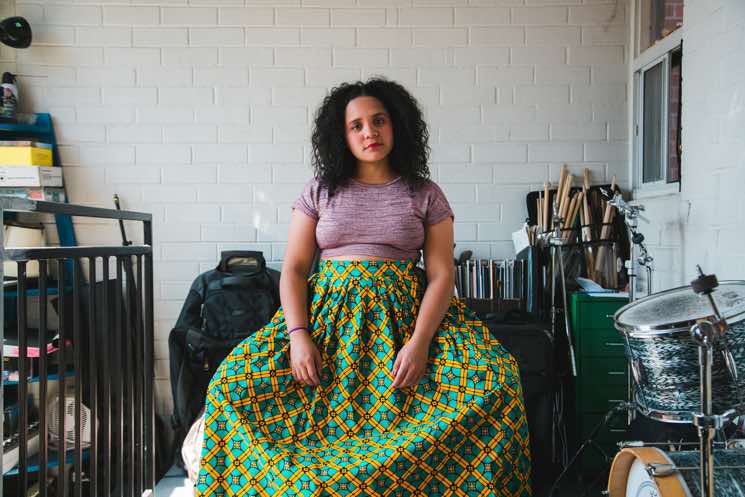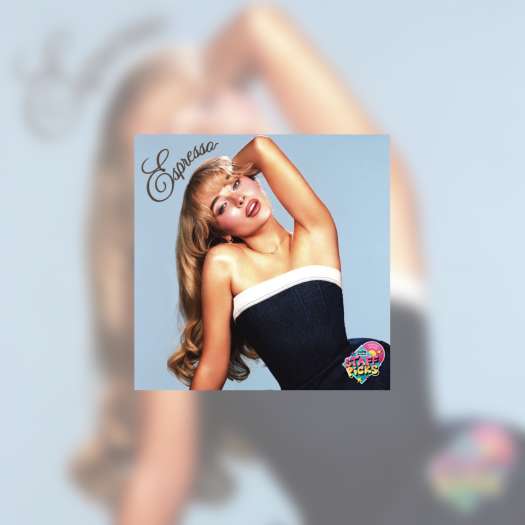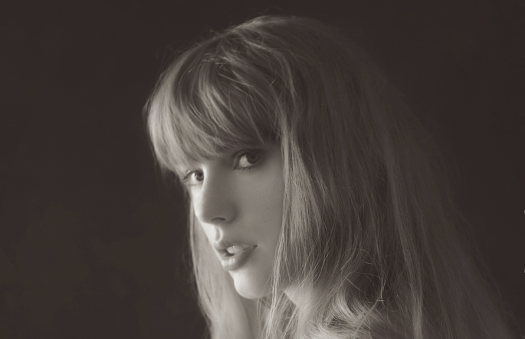In Toronto, Lido Pimienta is home.
It took the dissolution of her marriage for the Colombian-born, 2017 Polaris Music Prize winner to realize that living in Southwestern Ontario was not where she wanted to be, both from an artistic perspective but also as a single mother.
"[It] wasn't big enough for me," Pimienta says emphatically.
So the musician, producer and visual artist packed up — with just "my baby, my drawings, and my computer" — and set off for Toronto. Pimienta managed to find the perfect home in the city's Little Italy neighbourhood, a cozy place that serves both as her home and mixed media studio.
"It's a really nice spot. I have a patio and deck, and a sunroom where I rehearse and practice the music," she says.
The biggest room in the house, she adds, functions as a recording studio and art room. It's where she creates most of her music, including the place where the Polaris Music Prize-winning record, La Papessa, was conceived.
"We live on top of a music school and we hear sweet classical music while in the home. But they close at 8 p.m, and that's when I do the recording," she says. "A song will come to me when I'm feeding my son and doing the dishes," she says. "My life is very domestic. I don't like to go out. I don't drink, smoke — if I'm not the party, I'm not at the party. I don't soundproof and most of the music that I do is electronic — so things that I edit and work on is done using headphones."
While trained in voice — she took music lessons in her native Colombia and is versed in the oral traditions of Afro-Colombian music — she is largely self-taught when it comes to producing and recording. She has evolved as an artist from her early days of using more ground-level recording tools such as REAPER software, to a recording setup that involves the Ableton digital audio workstation, a Roland SP-404 sampler, a Vermona analog drum machine, Audio Technica and Blue USB microphones and a Boss vocal effect processor/pedal to trigger the sound.
"My music is very melodic and simple. I'm creating it so I can perform it live. So the production part of it is not something I'm completely obsessed with," she says. To that end, her DIY approach involves using a lot of YouTube tutorials when producing. "I don't have time to sit for six hours to learn from somebody, or find a mentor. I go and learn things. I know by doing."
While her sound leans on electronic elements, it is rooted, first and foremost, in her voice and a traditional, organic sound. "My voice is the centre. It's the most important thing that I do. Everything that happens electronically follows the voice. The voice is not chasing after the electronic sound, it's trying to catch up with me. And it never does — that's that game we are playing.
"It's limiting when you depend on the electronic sound completely," she says. "I try not to use computers live — aesthetically I don't like how it looks onstage, and you can't rely on computers to not break during the set," she says. When recording and performing, a mix of electronic tools (including Moog synthesizers) and traditional Afro-Colombian percussion (tambora drums, maracas), all figure into the flow.
The process of creation, for Pimienta, is "very prolific, very fertile ground." She records "skeletons" as basic music frameworks, which she then presents to her band in a weekly session. "Melodies come to me and I will just put my headphones on and do a little demo. I send it to my bandmates and then the following Tuesday, we will start practicing that and finessing the sound," she says. "I deliver the skeleton and each person in my band has something to add — adding the meat and the blood to it. Then I add the skin to it with my voice. That's how we work — from my headphones to practicing to performing it live. If people like it, we keep working on it. I work very immediate. I don't take too long. I know when a song works and when it doesn't work," she says.
She admits to being overprotective of her music but considers her bandmates as family. It's a collaborative process, but one where she has the final say.
"I'm very aware that I am a woman and feminist and intersectional. And as adoring as my bandmates are, they are still men and they will unwittingly say shit that I don't want to hear or give me what I want," she says. "It's really a big mix of a lot of disciplines coming together in a very beautiful package."
Her planned followup to La Papessa reflects her evolving creative process. "The album that I'm working on now is less collaborative. I'm working with a single producer and I'm giving him all of the parts and he's finessing it. I do enough; I don't need to be the best producer in the world because my songs are very strong," she says. "The beautiful thing about the way that I work [is] I can be in a show where it's just me and my voice, and people will be satisfied. And that is the way I want to always make music, where the song can be performed with an acoustic guitar and voice, or with one drum and voice, and it will have the same impact as it has with a full band."
But it all comes from her home and studio, she says, a place where she is able to both provide for her child and create independent art on her terms. "If you want music to be your life, you have to treat it like so. I'm completely engaged and enamoured and so proud of how this place has been transformed. It really tells the story of how I came to Toronto all by myself with my son.
"Me against the world, and I fucking did it. I made it."
It took the dissolution of her marriage for the Colombian-born, 2017 Polaris Music Prize winner to realize that living in Southwestern Ontario was not where she wanted to be, both from an artistic perspective but also as a single mother.
"[It] wasn't big enough for me," Pimienta says emphatically.
So the musician, producer and visual artist packed up — with just "my baby, my drawings, and my computer" — and set off for Toronto. Pimienta managed to find the perfect home in the city's Little Italy neighbourhood, a cozy place that serves both as her home and mixed media studio.
"It's a really nice spot. I have a patio and deck, and a sunroom where I rehearse and practice the music," she says.
The biggest room in the house, she adds, functions as a recording studio and art room. It's where she creates most of her music, including the place where the Polaris Music Prize-winning record, La Papessa, was conceived.
"We live on top of a music school and we hear sweet classical music while in the home. But they close at 8 p.m, and that's when I do the recording," she says. "A song will come to me when I'm feeding my son and doing the dishes," she says. "My life is very domestic. I don't like to go out. I don't drink, smoke — if I'm not the party, I'm not at the party. I don't soundproof and most of the music that I do is electronic — so things that I edit and work on is done using headphones."
While trained in voice — she took music lessons in her native Colombia and is versed in the oral traditions of Afro-Colombian music — she is largely self-taught when it comes to producing and recording. She has evolved as an artist from her early days of using more ground-level recording tools such as REAPER software, to a recording setup that involves the Ableton digital audio workstation, a Roland SP-404 sampler, a Vermona analog drum machine, Audio Technica and Blue USB microphones and a Boss vocal effect processor/pedal to trigger the sound.
"My music is very melodic and simple. I'm creating it so I can perform it live. So the production part of it is not something I'm completely obsessed with," she says. To that end, her DIY approach involves using a lot of YouTube tutorials when producing. "I don't have time to sit for six hours to learn from somebody, or find a mentor. I go and learn things. I know by doing."
While her sound leans on electronic elements, it is rooted, first and foremost, in her voice and a traditional, organic sound. "My voice is the centre. It's the most important thing that I do. Everything that happens electronically follows the voice. The voice is not chasing after the electronic sound, it's trying to catch up with me. And it never does — that's that game we are playing.
"It's limiting when you depend on the electronic sound completely," she says. "I try not to use computers live — aesthetically I don't like how it looks onstage, and you can't rely on computers to not break during the set," she says. When recording and performing, a mix of electronic tools (including Moog synthesizers) and traditional Afro-Colombian percussion (tambora drums, maracas), all figure into the flow.
The process of creation, for Pimienta, is "very prolific, very fertile ground." She records "skeletons" as basic music frameworks, which she then presents to her band in a weekly session. "Melodies come to me and I will just put my headphones on and do a little demo. I send it to my bandmates and then the following Tuesday, we will start practicing that and finessing the sound," she says. "I deliver the skeleton and each person in my band has something to add — adding the meat and the blood to it. Then I add the skin to it with my voice. That's how we work — from my headphones to practicing to performing it live. If people like it, we keep working on it. I work very immediate. I don't take too long. I know when a song works and when it doesn't work," she says.
She admits to being overprotective of her music but considers her bandmates as family. It's a collaborative process, but one where she has the final say.
"I'm very aware that I am a woman and feminist and intersectional. And as adoring as my bandmates are, they are still men and they will unwittingly say shit that I don't want to hear or give me what I want," she says. "It's really a big mix of a lot of disciplines coming together in a very beautiful package."
Her planned followup to La Papessa reflects her evolving creative process. "The album that I'm working on now is less collaborative. I'm working with a single producer and I'm giving him all of the parts and he's finessing it. I do enough; I don't need to be the best producer in the world because my songs are very strong," she says. "The beautiful thing about the way that I work [is] I can be in a show where it's just me and my voice, and people will be satisfied. And that is the way I want to always make music, where the song can be performed with an acoustic guitar and voice, or with one drum and voice, and it will have the same impact as it has with a full band."
But it all comes from her home and studio, she says, a place where she is able to both provide for her child and create independent art on her terms. "If you want music to be your life, you have to treat it like so. I'm completely engaged and enamoured and so proud of how this place has been transformed. It really tells the story of how I came to Toronto all by myself with my son.
"Me against the world, and I fucking did it. I made it."




